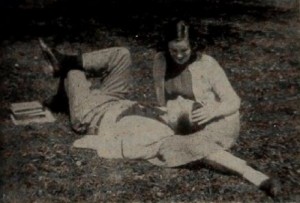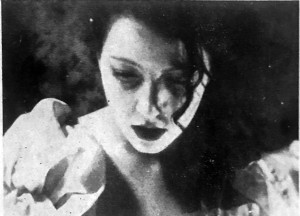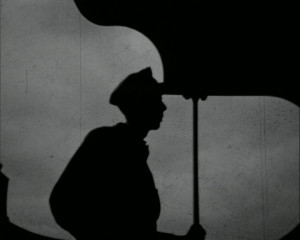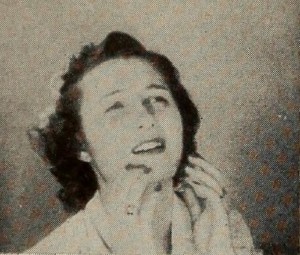
"Concerto, by Warren Doremus, is a sensitive and touching story of young love, following a couple from the joy of their graduation and marriage to the anguish and pain of the man's recall to war service in Korea. The telling of this simple tale has been done with such warmth that the observer cannot help being caught up in the current of emotions which fill the film. The performances of Sallie Dunn and George Harrison as the young couple convey the right mood for each scene with complete sincerity and heart, while Mr. Doremus's direction is forceful and yet restrained. Accompanied by and an interpretation of the Warsaw Concerto of Richard Addinsell, Concerto, the film, may truly be styled a cine tone poem." Movie Makers, Dec. 1953, 332.
"The Conscience is one of those psychological studies without being too psychological in its treatment and approach. A hit and run driver decides no one will know his crime, but he finds it hard to live with his conscience. Everywhere he looks he sees himself as judge and as prosecutor, finding himself guilty as he pleads for mercy. Photography is not the best, but the story is quite powerful" PSA Journal, Aug. 1967, 37.

"È la storia di una giovane donna di strada, Lilly. Uno scrittore Stefano Berg, attratto dal suo fascino, una sera la conduce a casa sua e se la tiene con se. In Lilly egli trova gli elementi del personaggio di un suo nuovo romanzo “Resurrectio”. L’opera è iniziata, il giovane scrittore ha già creato nella sua fantasia la trasformazione del personaggio. Nella realtà, però, anche Lilly va trasformandosi; ella già sente di non essere la donna di un tempo: sente d’amare Stefano Berg, che preso intensamente dell’ardore del suo romanzo non si avvede di tale trasformazione e l’abbandona. La giovane donna ritorna quella che era. Un attimo di sgomento ed ecco il suicidio. Il romanzo intanto è già ultimato: la storia della vita di Lilly già passa per le mani di tuti segnando il successo per Stefano Berg."
"It is the story of a young streetwalker, Lilly. A writer Stefano Berg, attracted by her charm, takes her to his home one evening and keeps her with him. In Lilly, he finds the elements of the character for his new novel of his, ""Resurrectio."" The work has begun, the young writer has already fantasized the character’s transformation. In reality, however, Lilly will transform herself; she already feels that she is not the woman she once was: she feels that she loves Stephen Berg, who, intensely caught up in the passion of his novel, does not notice this transformation and abandons her. The young woman returns to what she was. A moment of dismay and suddenly the suicide. In the meantime, the novel is already finished: the story of Lilly's life is already in everyone's hands, marking a success for Stefano Berg."
—Notizario delle sezioni cinematografiche dei gruppi universitari fascisti a cura del ministero della cultura popolare, September 1938 p. 9-10
"Curt is the story of a blind college student and the world in which he must live. Although he puts on a brave front, his problems exist and he must take them in stride. Dennis Thomas, who produced the film, brings his character to the audience, breathing life into him so effectively than long after the film is through one has a feeling for Curt and his world. The black-and-white photography is excellent throughout and the pacing shows an excellent knowledge of the mechanics of editing. This film well deserves the Student Film Award it received" PSA Journal, Sept. 1964, 50.

"Amateur filmmaker, cinema historian and railway engineer H.A.V. Bulleid brings his professional life and passionate pastime together in a tragic tale of young love hindered by an incurable disability and the cruelty of society. Ted works as a fireman on a steam locomotive and is deeply in love with Emily, a beautiful young lady. But Emily has a disability, the result of a childhood accident which left her with a terrible limp. Constant pity from friends and the prying eyes of strangers drives a wedge between the pair, and Ted's confrontation with colleagues outside Emily's house leads to harsh words, and tragic consequences" (EAFA Database).

"Maxine Messner, who began her career before her uncle's camera in 1948 with Maxine's Big Moment, has very probably ended it in Dark Interlude. Well, it was a career which began happily — with the simple elation of a school girl's first formal date. And it is one which now ends happily — with marriage. But in the course of this final production it was touch and go whether our heroine would achieve this happiness. For in Dark Interlude William Messner has asked his niece to play a young lady struck down — only temporarily, as it turns out — by blindness. It is a role which she discharges with a moving simplicity and honesty — as, in fact, do those who play her father and her sweetheart. And Mr. Messner brings to their aid superb camera work and delicately luminous dramatic lighting. Unfortunately, however, the development of his basic theme does not match in simplicity and clarity either the film's playing or its production values." Movie Makers, Dec. 1953, 334.
""The Derelict" by Robert Board is a smooth scenario depicting one chapter in the life of a derelict. As the title might imply, the setting is near the railroad and the low economic area. As one may expect, the derelict is hungry and alone. We are made to realize the emotional impact of this situation and the kindheartedness of others who cross his path. there are girls to whet his interest and others who are more considerate and helpful. His one effort to seek work fails and he returns to the rails." PSA Journal, Nov. 1957, 32.

"Whatever that intangible thing called atmosphere may be, Harold E. Remier has created it — out of airy nothings, to judge by what he says — in his astounding photoplay, Diary. Here, in all its hues, in all its beauty, in all its tradition of courtesy and profound courage is the America of the late Nineteenth Century, told through the medium of a woman's devotion. A Southern mansion is the first setting, then the frontier. Fortunes rise and fall as the war flames. Costumes and settings of the 1890's are recreated with fidelity. Wagons collapse in the wilderness; stone houses are built; a silver mine is uncovered. And the cost, for this epic achievement, exclusive of the 8mm. film, was the staggering sum of ten dollars! Diary is particularly noteworthy for naturalness of its lighting. However he managed it, Mr. Remier. with two large flood bulbs, somehow succeeded in making each scene appear to be illuminated by the hand lamps and chandeliers visible within it. The moonlight elopement is glamorously effective; and even candlelight is simulated with success. So, in all, the picture is a distinguished achievement — a portrayal, not only of a past century, but of a part of our American heritage." Movie Makers, Dec. 1940, 577.
"The film opens at the Atheneum Club where members are playing cards. They talk about a man named Pierpont who has an interest in the supernatural and has invited them to a séance the following day. At the séance Pierpont welcomes the visitors and introduces a man called Horace who will be the séance medium. Having set the scene by playing music and dimming the lights, Pierpont hypnotizes Horace and puts him into a wooden box. The séance continues with questions being asked to Horace in the box. When there is no answer, Pierpont opens the box and announces that Horace is dead. The horrified guests leave and find the police. On their return to the room, they find that the body is missing and Pierpont is questioned. Horace returns to the room alive and one of the guests remarks that this should be a lesson to them all" (MACE Online Archive).
Total Pages: 12